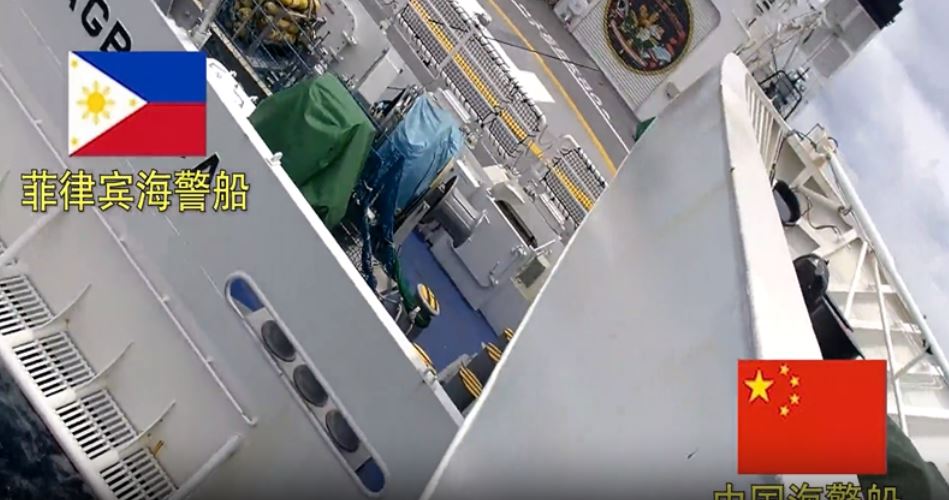At 08:02 on Saturday, the Philippine ship 9701 weighed anchor and continued its provocations at China’s Xianbin Jiao (also known as Xianbin Reef) in the South China Sea. In response, the Chinese coast guard ship 5205 lawfully issued verbal warnings and conducted monitoring and control measures, according to the China Coast Guard (CCG) on Saturday.
At 12:06, the Philippine ship deliberately rammed into the Chinese ship 5205 in an unprofessional and dangerous manner, causing a collision for which the Philippines bears full responsibility, CCG spokesperson Liu Dejun said.
China once again urges the Philippines to face reality, abandon illusions, and immediately withdraw their illegal ship, as this is the only correct path forward. The Philippines should not misinterpret the situation, provoke conflicts, or escalate tensions, otherwise, the consequences will be solely borne by the Philippine side, the spokesperson warned.
The CCG reiterated China’s indisputable sovereignty over Nansha Qundao, or Nansha Islands, including Xianbin Jiao, and their adjacent waters. China will take necessary measures to resolutely thwart any provocative acts of infringement and firmly defend the country’s territorial sovereignty and maritime rights and interests, the spokesperson said.
Since mid-April, the Philippine Coast Guard ship 9701, also known as BRP Teresa Magbanua, has been illegally and harmfully anchored in the lagoon of the Xianbin Jiao.
The Philippines’ long-term anchoring at Xianbin Jiao constitutes illegal occupation, which does not change the legal status of the occupied territory, according to Zhang Qiyue, a research fellow at Shanghai Institute for International Studies.
The Philippines has seriously infringed on China’s territorial sovereignty and maritime rights, violating the basic principles of the United Nations Charter for the peaceful resolution of international disputes, and gone against the spirit of the United Nations Convention on the Law of the Sea, which promotes peaceful use of the seas, Zhang stressed, noting that this action has caused serious damage to international legal norms and the rule of law.
In response to the illegal intrusion of Philippine vessel 9701 into Xianbin Jiao, China has shown a high degree of restraint by refraining from taking forceful measures against it, and only implementing necessary control measures to prevent the vessel from staying long-term, said Chen Xidi, a research fellow at China Institute for Marine Affairs, noting that China has been actively communicating with the Philippine side throughout this situation.
This fully demonstrates China’s sincerity in adhering to the Declaration on the Conduct of Parties in the South China Sea, not expanding and peacefully resolving disputes, Chen said. “In sharp contrast, the Philippines continues provocations by deliberately ramming into the Chinese ship. The Philippines is the one undermining peace and stability in the South China Sea, and violating humanitarian principles,” Chen noted.
In fact, the Philippines is not concerned about the safety of its ships, aircraft, and personnel at Xianbin Jiao, nor does it care about the “freedom” and “stability” of the South China Sea, Chen noted. “The only thing the Philippines cares about is whether its actions in the South China Sea are aggressive and attention-grabbing enough, and whether it can win the ‘favor’ and ‘support’ of certain countries outside the region,” Chen said.
Experts urged the Philippine side not to harbor any illusions about the illegal occupation of Xianbin Jiao, nor to repeatedly test China’s bottom line. Otherwise, it will only waste time and be of no benefit to the resolution of the dispute.
“The only way to solve the dispute is for the Philippine side to withdraw its coast guard ship and other vessels as soon as possible, and restore peace and stability in the South China Sea,” Zhang said.
On Friday, China released an on-site investigative report regarding the ecological system of the coral reefs in the South China Sea’s Xianbin Jiao, revealing the coral reef ecosystem in Xianbin Jiao is generally in good health, in response to allegations made by the Philippines this year, which groundlessly accused China of reclaiming an artificial reef around Xianbin Jiao that led to widespread coral bleaching.
GT




